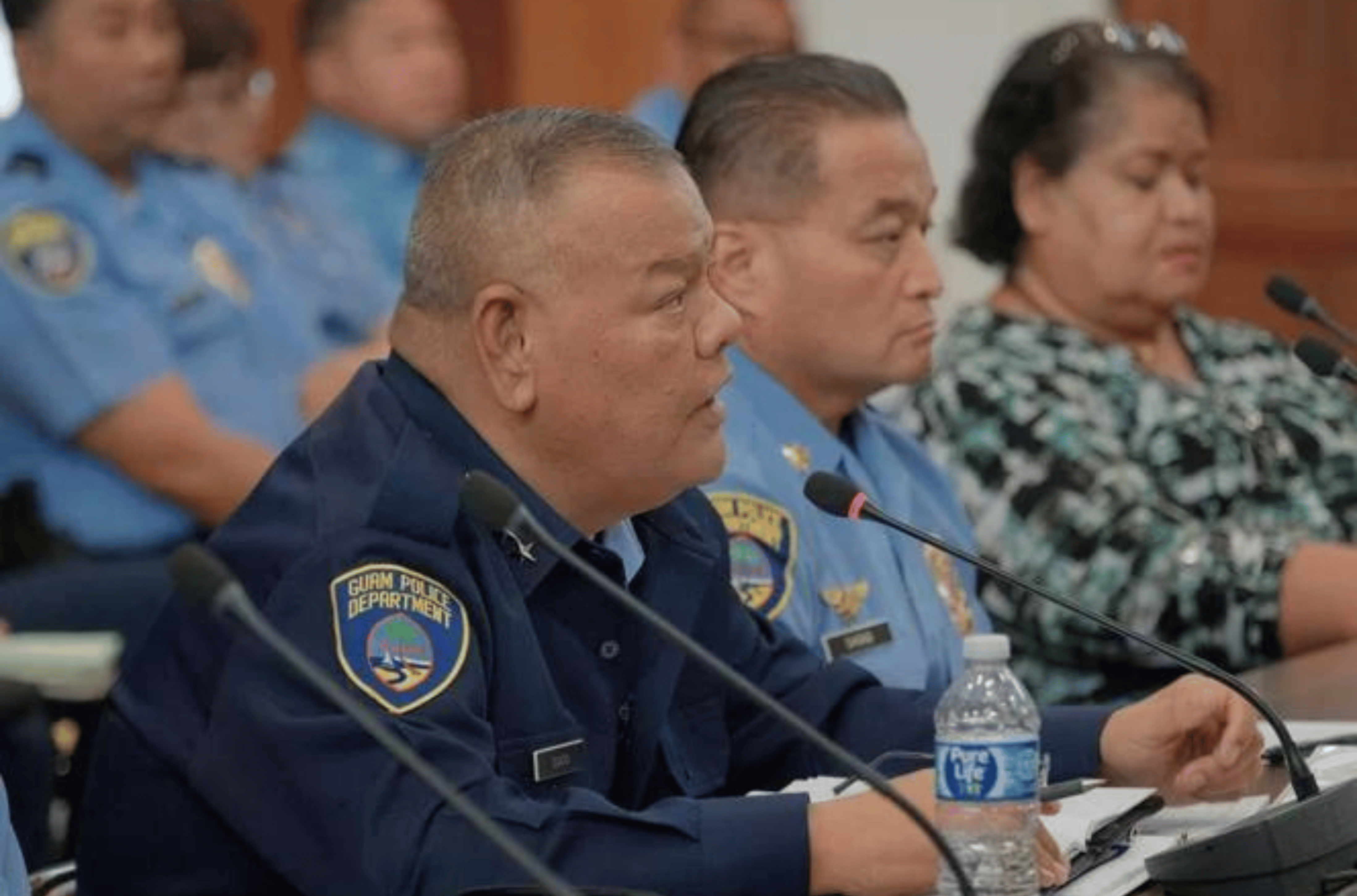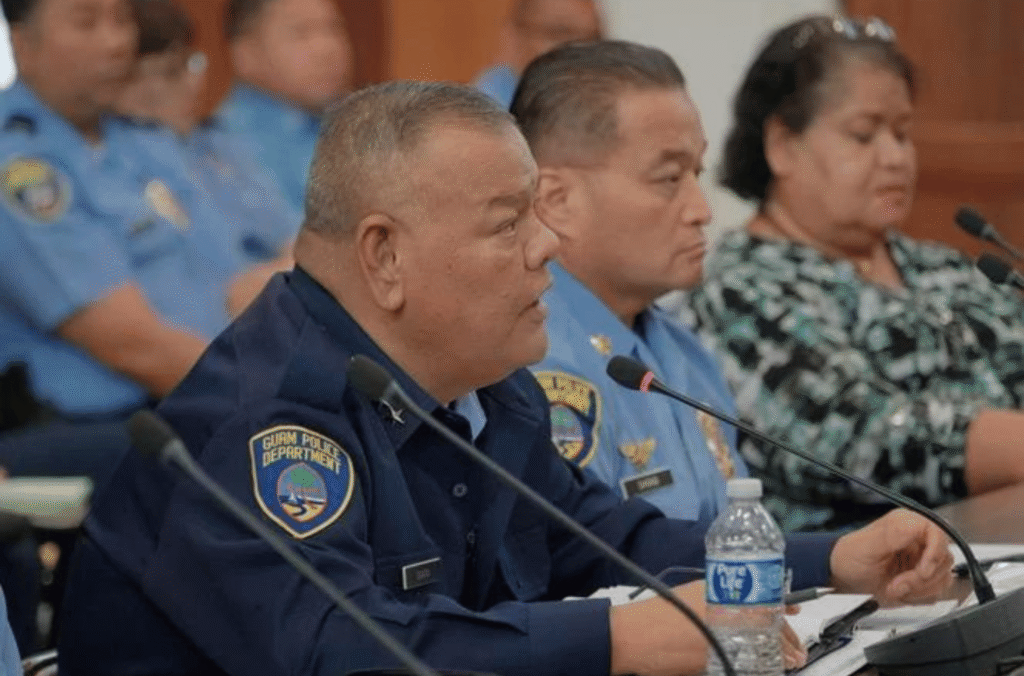HAGÅTÑA (The Guam Daily Post) — The Guam Police Department has not published internal investigation complaints on its website since 2015, which, according to Chief Stephen Ignacio, is required by law.
On Wednesday afternoon, the Guam Congress Building’s Public Hearing Room was filled with men and women from GPD as police leadership appeared before the 37th Guam Legislature for an oversight hearing held by public safety committee chair Sen. Chris Barnett.
While topics on the agenda of the oversight hearing included discussions about the status of the DNA crime lab, promotions, recruitment and retention and the two high-profile robbery and murder cases this year, Barnett called the hearing in light of claims from the public in recent months regarding officer misconduct.
Ignacio started the hearing by giving a presentation covering all the topics on the agenda, which lasted about 40 minutes. In the presentation, Ignacio disclosed that from 2023 to the present, there have been 77 complaints filed against GPD officers.
Eighteen of those were complaints of unsatisfactory performance and another 18 were for unbecoming conduct, while 20 of the complaints were for vehicle operations, Ignacio said. The chief confirmed, of the 67 complaints received by GPD’s Internal Affairs Section in 2023, 48 were closed, or the evidence was not sustained, and 19 resulted in adverse actions.
Ignacio later explained, after being asked by Barnett, the difference between unsatisfactory performance and unbecoming conduct.
“Unsatisfactory performance could be an officer failed to take a complaint and a member of our community was not happy with the outcome of the investigation. … Unbecoming conduct serves in the range of maybe an officer was alleged of raising his voice at a member of the community and did not conduct themselves professionally,” Ignacio explained.
The ten complaints filed this year are pending thorough investigation, which goes on for 90 days and consists of an initial Internal Affairs intake and review before the investigation begins. An assessment is conducted before a form of discipline for the actions is recommended, Ignacio said.
Complaints regarding use of force also were discussed. Ignacio confirmed, from 2021 to present, there have been an average of 3.75 complaints per year.
Use-of-force complaints similarly involve internal investigations. However, for instances such as officer-involved shootings, the conduct also is reviewed by an independent body, the Independent Investigative Team, before an officer is possibly arrested, goes through the legal process and is disciplined by the department.
Publishing complaints
While The Guam Daily Post continues to publish incidents of officer misconduct, the public rarely learns of the disciplinary action taken toward that officer after an investigation. Barnett said he had been in receipt of several complaints ranging from officers destroying evidence and leaving their duty weapon at a bar, to officers being accused of domestic violence.
Barnett, who does not necessarily learn the outcomes of the investigation, further asked Ignacio if GPD is mandated by law to post Internal Affairs complaints online, considering that after doing research, Barnett found the complaints were last posted in 2015.
“It (complaints) should be on our website. Unfortunately, that’s one area where we fall short of,” said Ignacio, adding that GPD’s website is not fully controlled by the department, “but falls under the purview of the Office of Technology.”
Ignacio, who was appointed chief in 2019, then confirmed the Internal Affairs complaints are supposed to be posted on the website.
“The Internal Affairs cases are one of those things that are required to be posted on our website, and I will admit that’s one area where we fall short,” Ignacio said.
The Post reviewed the 2015 document relating to Internal Affairs cases and details disclosed in the document show the general allegations made toward a GPD employee, whether the case was opened or closed, if there was evidence to sustain an investigation and the disposition of the case, which confirms what form of discipline was given to the employee.
Taitano
Barnett also asked Ignacio in particular about an allegation of police brutality during the arrest of Joshua Paul Taitano. Surveillance footage showed Taitano being hit by a patrol car and being tackled by an officer before other officers arrived to restrain him.
“I was watching this clip, not to make light of it all, … I felt like I was watching a clip from (Pacific Xtreme Combat) because … I saw a left, a right (and) a knee thrown by an officer. So, I guess, just first, if you could kind of go through what was shown in that video and maybe share with the viewing public what is authorized use of force and what isn’t” Barnett asked.
Ignacio, who during his presentation had discussed the use of force by police officers, responded, “We employ different types of tactics.”
“Some, you know, may be surprising to the public as to what we can and cannot use, but at the end of the day, we used what we called the necessary amount of force to overcome resistance,” Ignacio said.
“So I guess, just for further clarity, are Guam Police Department officers … allowed to strike with a closed fist?” Barnett asked in a follow-up question.
“We do have some techniques that involve the use of physical force,” Ignacio responded.
Staffing issues
During the hearing, Sen. Chris Duenas asked Ignacio if there is a policy that allows GPD to be investigated by other law enforcement agencies. Ignacio responded that it is more often that GPD is asked to investigate internal issues.
“The Guam Police Department is really one of hose departments that, in the law enforcement community, we have a well-established Internal Affairs Section, and we take appropriate action depending on the outcome of our investigations and so the opposite is true,” Ignacio said.
Duenas subsequently asked if Internal Affairs investigators “rotate” to allow different employees to conduct the investigations.
Like the rest of GPD, Ignacio said, the Internal Affairs Section is short on staff and recently lost an investigator to a promotion. Ignacio said the investigator would not be replaced.
Transparency
Following questions from the rest of the panel of senators, near the end of the hearing, Barnett gave Ignacio an opportunity to discuss the limitations Ignacio faces when releasing information to the public regarding complaints against officers.
“Part of what I believe the problem is, it’s almost like a funnel. We start with a whole lot of information that the media reports. And these complaints (and) allegations make their way through the process. And the Guam Police Department, the amount of information that’s released, even after an investigation is completed as it (is) doesn’t satisfy the public’s desire for transparency and accountability,” said Barnett, who said the issue is “compounded” by the lack of published complaints on GPD’s website.
“There are certain limitations that I have as a director, as an executive, to put out information. I can’t openly discuss (the) outcomes of personnel administrative investigations. … I didn’t create (the) term, ‘It’s a personnel matter.’ … I’m not the first to use that term,” Ignacio said.
“I want to be more transparent, but you do understand (the) limitations. But I will admit, and I have talked about this earlier, there’s work that can be done. And there’s more work we need to do on our website,” Ignacio added.
Ignacio also explained that of the 30,000 calls received and responded to on average by GPD in a given year, less than a handful of use-of-force complaints are filed, but one allegation or video can “skew the perception against the police department.”
Additionally, Ignacio expressed that discipline is meant to be “corrective.”
“Disciplinary action is not only meant to be punitive, meaning you’re going to get suspended, you’re going to get a reprimand, it’s also meant … to be corrective in nature. What can we do? What can we learn and how can we do (it) to better our department and our officers to ensure that it doesn’t happen again?” Ignacio said.












